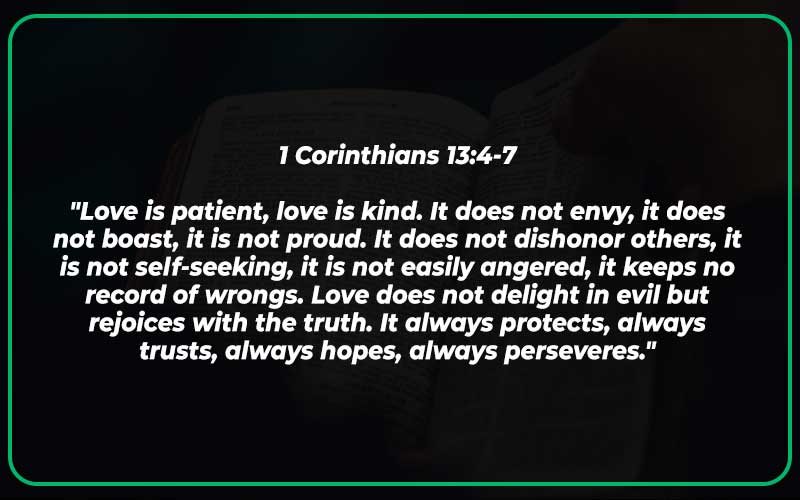Self-love, when grounded in a healthy understanding of our identity in Christ, is essential for our overall well-being and our ability to love others.
The Bible contains verses that affirm our worth, encourage self-care, and guide us in cultivating a balanced love for ourselves.
Join me as we explore uplifting Bible verses about loving yourself, discovering the transformative power of God’s love and the profound impact it can have on our relationships and personal growth.
Also Read: Bible Verses About Oceans
Bible Verses About Loving Yourself
Mark 12:31
“The second is this: ‘Love your neighbor as yourself.’ There is no commandment greater than these.”
This verse highlights the importance of self-love and how it is linked to loving others. The command to love others as ourselves presupposes a healthy self-love. As we love and care for ourselves well, we are better equipped to love and care for others.
Genesis 1:27
“So God created mankind in his own image, in the image of God he created them; male and female he created them.”
This verse reminds us that we are created in the image of God, which means we are valuable and worthy of love. Our unique qualities, characteristics, and talents are all part of God’s design for us. Thus, we should love ourselves and others as unique and valuable children of God.
Psalm 139:14
“I praise you because I am fearfully and wonderfully made; your works are wonderful, I know that full well.”
This verse reinforces the truth that we are wonderfully made by God. Each of us has our unique qualities and traits that make us special and valuable to God. It is a reason to love and cherish ourselves.
Ephesians 2:10
“For we are God’s handiwork, created in Christ Jesus to do good works, which God prepared in advance for us to do.”
This verse reminds us that we are created to do good works, and that in Christ, we have value and purpose. As we recognize our worth, we can better care for ourselves and fulfill the purpose God has for us.
1 Corinthians 6:19-20
“Do you not know that your bodies are temples of the Holy Spirit, who is in you, whom you have received from God? You are not your own; you were bought at a price. Therefore honor God with your bodies.”
This verse emphasizes the importance of taking care of our bodies as we honor God. We should love ourselves enough to make choices that support our physical health and well-being, as our bodies are temples of the Holy Spirit.
Galatians 5:22-23
“But the fruit of the Spirit is love, joy, peace, forbearance, kindness, goodness, faithfulness, gentleness and self-control. Against such things there is no law.”
This verse highlights the fruit of the Spirit, which includes self-control. Part of loving ourselves means practicing self-discipline and setting boundaries to protect our emotional, physical, and mental health.
Proverbs 19:8
“The one who gets wisdom loves life; the one who cherishes understanding will soon prosper.”
This verse emphasizes the importance of gaining wisdom and understanding to love and cherish life. As we learn and grow in knowledge, we can better understand ourselves, our worth, and how to care for ourselves well.
Matthew 22:39
“And the second is like it: ‘Love your neighbor as yourself.’”
Similar to Mark 12:31, this verse reinforces the importance of self-love as the foundation for loving others well. It highlights the need to love ourselves with the same care and attention we give to others.
Romans 12:3-6
“For by the grace given me I say to every one of you: Do not think of yourself more highly than you ought, but rather think of yourself with sober judgment, in accordance with the faith God has distributed to each of you. For just as each of us has one body with many members, and these members do not all have the same function, so in Christ we, though many, form one body, and each member belongs to all the others.”
This verse reminds us to have a balanced view of ourselves. We should not think too highly or too lowly of ourselves, but rather with sober judgment. We are part of the body of Christ, and each member has a unique function and purpose that is valuable and necessary.
Philippians 4:8
“Finally, brothers and sisters, whatever is true, whatever is noble, whatever is right, whatever is pure, whatever is lovely, whatever is admirable—if anything is excellent or praiseworthy—think about such things.”
This verse emphasizes the importance of reminding ourselves of our strengths and positive qualities. We should focus our thoughts on things that are true, noble, and admirable and not dwell on negative thoughts. As we think positively, we build self-confidence and self-love.

1 John 4:19
“We love because he first loved us.”
This verse reminds us that our ability to love others is based on God’s love for us. As we experience and accept God’s love, we can better love ourselves and others.
2 Timothy 1:7
“For the Spirit God gave us does not make us timid, but gives us power, love and self-discipline.”
This verse emphasizes the power and strength that comes from the Holy Spirit, which helps us love and care for ourselves well. It reminds us that we can approach life with confidence, knowing that the Spirit gives us the tools to succeed.
Psalm 23:1-3
“The Lord is my shepherd, I lack nothing. He makes me lie down in green pastures, he leads me beside quiet waters, he refreshes my soul. He guides me along the right paths for his name’s sake.”
This verse reminds us that the Lord is our shepherd and cares for all our needs. As we rest in Him and follow His lead, we can find rest for our souls and refreshment.
Isaiah 43:4
“Since you are precious and honored in my sight, and because I love you, I will give people in exchange for you, nations in exchange for your life.”
This verse emphasizes God’s love for us and how much He values us. We are precious and honored in His sight. He is willing to give up everything for our lives, and that is a reason to love and value ourselves as well.
Psalm 16:11
“You make known to me the path of life; you will fill me with joy in your presence, with eternal pleasures at your right hand.”
This verse reminds us that the Lord is our guide and will lead us on the path of life. As we seek His presence, we can find joy and pleasures that last forever. It is a reason to love and care for ourselves well so that we can enjoy the journey of life.
Psalm 139:1-4
“You have searched me, Lord, and you know me. You know when I sit and when I rise; you perceive my thoughts from afar. You discern my going out and my lying down; you are familiar with all my ways. Before a word is on my tongue you, Lord, know it completely.”
This verse reminds us that God knows us intimately and understands us completely. We are fully known and fully loved by Him. It is a reason to love and cherish ourselves as we are known and loved by God.
Romans 8:38-39
“For I am convinced that neither death nor life, neither angels nor demons, neither the present nor the future, nor any powers, neither height nor depth, nor anything else in all creation, will be able to separate us from the love of God that is in Christ Jesus our Lord.”
This verse emphasizes God’s love for us and that nothing can separate us from it. As we stand firm in His love, we can love and care for ourselves well with confidence and assurance of His constant presence.
1 Corinthians 13:4-7
“Love is patient, love is kind. It does not envy, it does not boast, it is not proud. It does not dishonor others, it is not self-seeking, it is not easily angered, it keeps no record of wrongs. Love does not delight in evil but rejoices with the truth. It always protects, always trusts, always hopes, always perseveres.”
This verse highlights the characteristics of love, including the importance of not being self-seeking. As we practice self-love, we also need to love others well, being patient, kind, and protective.

What does the bible say About Loving Yourself?
The concept of loving oneself is not explicitly stated in the Bible as a command or directive. However, the Bible does provide valuable insights and principles that can be interpreted as guidance on how to approach self-love and self-worth.
- Love Your Neighbor as Yourself: One of the most well-known passages in the Bible that indirectly addresses self-love is found in Mark 12:31: “Love your neighbor as yourself.” This verse assumes that a healthy level of self-love is already present. In other words, the Bible acknowledges that a natural love for oneself exists, and this love serves as a standard for how we should love others.
- You Are God’s Creation: Throughout the Bible, there are references to God creating human beings in His image (Genesis 1:26-27). Understanding and appreciating this divine origin should lead us to respect and love ourselves as valuable and purposeful beings.
- Taking Care of Your Body: The Bible emphasizes that our bodies are temples of the Holy Spirit (1 Corinthians 6:19-20). This teaching encourages believers to maintain physical and mental well-being, which can be seen as an act of self-love and self-respect.
- Forgiving Yourself: While the Bible emphasizes the importance of repentance and seeking forgiveness from God and others, it also highlights God’s grace and willingness to forgive our sins (1 John 1:9). Accepting God’s forgiveness and forgiving ourselves is essential for nurturing a healthy sense of self-love and worth.
- Guarding Against Pride: While the Bible acknowledges the value of self-love, it also warns against excessive pride and self-centeredness (Philippians 2:3-4). It encourages humility and considering the needs of others as equally important.
- Knowing Your Identity in Christ: The Bible teaches that believers are “God’s handiwork, created in Christ Jesus to do good works” (Ephesians 2:10). Understanding and embracing our identity in Christ can foster a positive self-image and genuine love for ourselves.
In summary, while the Bible does not explicitly command self-love, it encourages a healthy and balanced perspective of ourselves. Recognizing our worth as creations of God, practicing self-care, accepting forgiveness, and understanding our identity in Christ all contribute to a biblical approach to loving oneself. This love, in turn, becomes a foundation for loving others in a meaningful and genuine way.

